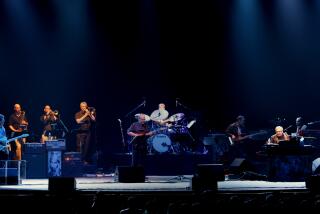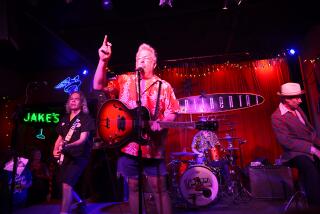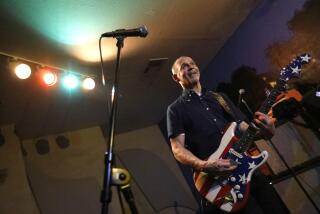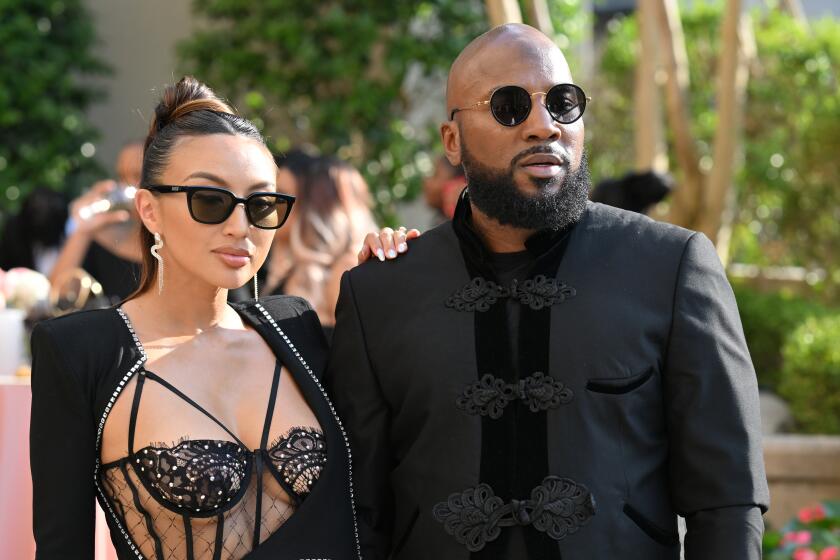Henry Rollins celebrates Cool ‘Disco’ Dan
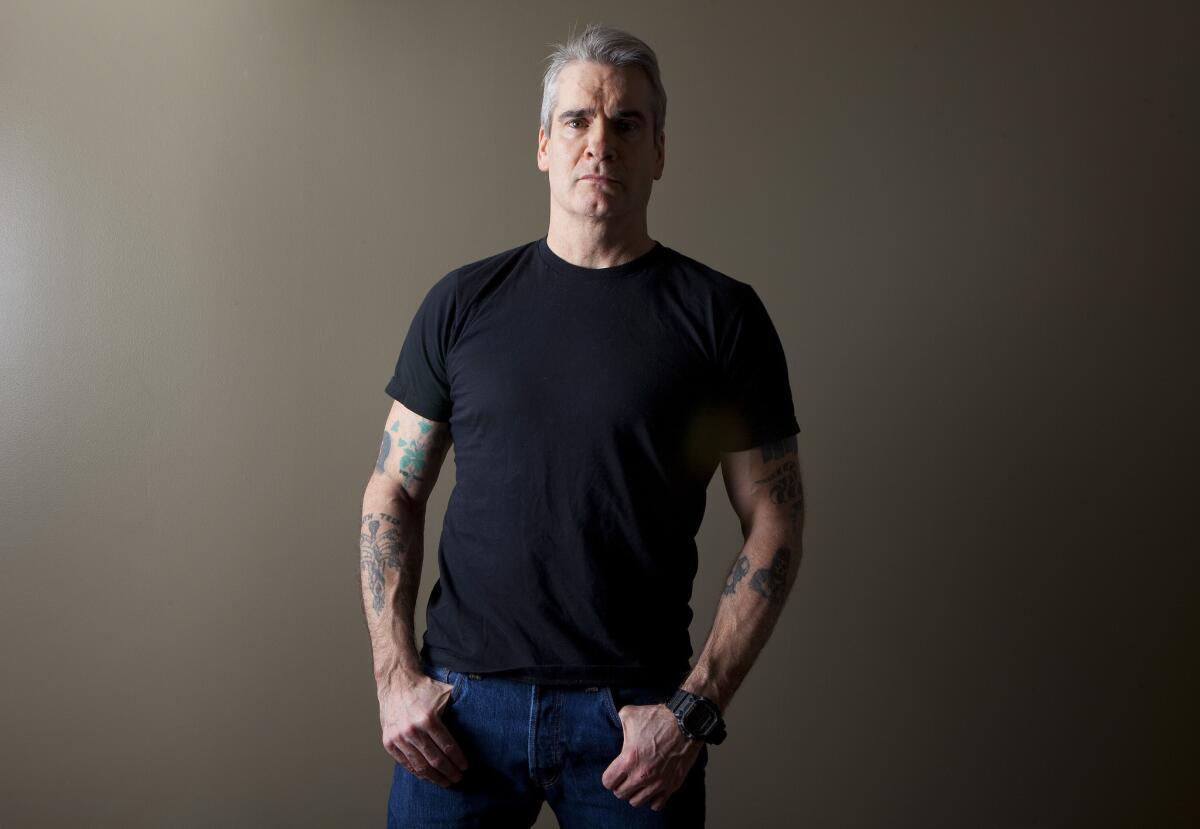
Henry Rollins in 2013.
After joining the L.A. hard-core band Black Flag, Henry Rollins became one of the most intense frontmen in rock. Yet even he had to take a back seat to the hold that Cool “Disco” Dan held over his hometown of Washington, D.C., in the ‘80s.
A kind of people’s regional superhero, the graffiti artist Cool “Disco” Dan left his distinct tag all over the city while a new strain of funk music, go-go, became the backbeat of African American D.C. Rollins narrates “The Legend of Cool ‘Disco’ Dan,” a documentary on the artist and the era (now available on DVD and streaming at cooldiscodan.com). Rollins also stars in two of his most intense roles yet — a cannibal in the forthcoming feature film “He Never Died” and as the last holdout from a rash of Black Flag reunion projects and trademark lawsuits.
Take me back to this time and place, of D.C. in the ‘80s.
For tourists, it’s one city, but for those live in it, it’s something else. D.C. in the ‘80s was this beautiful city with all this violence and Ronald Reagan benignly waving, and a few blocks from the White House people were getting shot for drugs. Meanwhile, you have go-go music as the heartbeat of D.C. You can go to Baltimore and someone won’t know what go-go is, but get to D.C. and go-go is go-go. All the punk rockers were fans of go-go; we’d go to a Minor Threat show and wish we had the guts to go downtown and see Mass Extinction or Trouble Funk.
INTERACTIVE: Discover songs of L.A.
The Cool “Disco” Dan documentary, for me as a casual observer and a fan, tells such a great story about an interesting artist with a unique ride through life but also a story of D.C. in the ‘80s. When you see Disco Dan graffiti, it hits a primordial chord in a D.C. native’s mind. I mean, who in the ‘80s claimed “disco,” one of the most vilified genres ever? Yet this guy is like “I’m Cool ‘Disco’ Dan.” Roger [Gastman, executive producer] and Joseph [Pattisall, director] got a great story of a guy and his unique way of validating his own existence.
He was so well known around town, but no one knew who he really was.
As famous as he was, he was draped in anonymity. It’s an interesting concept to get famous and not be able to say “It’s me!” He had to go under a cloak of darkness, and it must be frustrating to be the Lone Ranger — you want to take the mask off.
Hence the passion of the go-go fans. No politician was addressing these people, so it had to be music.
These records were made and pressed locally, sold out of car trunks. Now to be sure, I lived in safe, white, middle-class neighborhoods. I’d love to say go-go was “my music,” but being a white guy in the ‘70s and ‘80s, I appreciated that music, but my skin color and the climate of D.C. at the time made it where I have to say, “I’m a fan, but that’s down the road from me.” Dischord Records, that’s my flag, but I wish it was go-go too.
Though I’d once dated a girl from Adams Morgan, and I’d walk around looking all punk, and a guy came up to me and said, “Man, you in that band KISS?” I said, “No, man, I’m just a guy,” and he said “You punk? I’m funk.” And we shook hands. Those genres are woven together in D.C. They’re about energy and frustration, camaraderie and unity. But I’m living three miles away from the guys who made these records, yet I can’t go to shows. I’m so close, but there’s a thin line I can’t get over.
Speaking of feeling angry and frustrated, you star in a new film as an undead cannibal.
I can’t spoil it, but this guy has been alive for thousands of years, and he’s so bored. He watches TV 15 hours a day because he’s done everything. He dated Cleopatra, what are you gonna show him today? No one writes anything for me but parking tickets, but his existentialist ennui, I was like, “Oh, yes!” It’s a statement on violence and boredom, and his take is like “Eh.” When I joined Black Flag, they asked if I’d move here and live out of a duffel bag, and I said, “Yeah, I’ve got nothing else going on.”
PHOTOS: Celebrities by The Times
Given your romantic fixation on that time, what do you make of all the recent Black Flag revival projects [a new Black Flag album from founder Greg Ginn, and a greatest-hits tour featuring former members playing as Flag] and trademark lawsuits?
It was interesting when Greg [Ginn] said I’d [Rollins] never quit Black Flag. When the last tour was over, I was licking my wounds and living at my mom’s, and Greg calls me to tell me, “I quit Black Flag.” I said, “It’s your band!” He said, “Yeah, well, I quit.” That was that, and then I started writing songs for my solo record. I don’t think about that band unless I’m asked.
For me, Black Flag songs were battle hymns. They weren’t tours, but wars. Not to disrespect anyone in the band, but they know my discontent with what they’re doing. They say, “We have a right to play the songs,” but you and I have a right to play the entire Queen catalog tonight. I bled for that band, but I’m one of 15 people in that band. The legacy is up to what others do, but you can treat something with a bit of care and make sure its grave is kept clean.
More to Read
The biggest entertainment stories
Get our big stories about Hollywood, film, television, music, arts, culture and more right in your inbox as soon as they publish.
You may occasionally receive promotional content from the Los Angeles Times.
